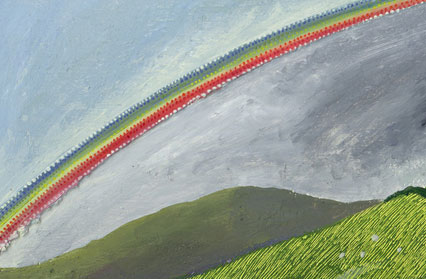The Invisibility
You can climb these hills a hundred times
and never meet your shadows – those shadows
mountains are meant to keep. Impossible
to think they have forgotten I stepped up
there and lingered here; stood there, arms outstretched
to catch the song of a skylark, a flake
of snow; a joy. Summer, I picnicked here,
with sheep, on bread, beer and Blaenavon cheese –
there, too, at the edge, I fed your ravens.
Grouse cluck, the pipits pipe, and I answer.
Times were, I roamed among your wild ponies,
their manes thick like a lion’s, heat buzzing off them,
and touched their breathy muzzles with my hand.
Slipped down that green wet stone; limped for a week.
I’ve seen iridescence turn insects and birds
into gleaming colours exceeding rainbows.
And I know well your rainbows.
Mud, red – boot to chin in that boggy spot,
the grass like glass. Once, twice, three times
you have known me circle at your summit
as though the high hawks were turning me,
and bless the blue, breathe in the mist, or rain,
the breakthrough light, or you. And drink
from your springs like one thirsting only
until I could find you again, within,
tasting of rock, winberry and heather.
I have lain on the dry heath, listening
to the secret lullabies of breeding birds
and seen them soar, singing, singing.
Do you not remember me,
when the echoes of these are forever
in your haunting winds, your grasses and stones
bear imprint of the tiny creatures
that move through you?
But we must learn to belong without
remembrance, to learn loneliness as a given;
solitude too; and then . . . you know, you know.
To Talybont
Past The Falcon that perches over the valley
three miles from Bwlyth, while real hawks circle up
all the way to the sun with not an ox in sight
to bear up the name of the little town.
Still climbing – higher into the Beacons
and Talybont village sharp left; its famous White Hart,
as with the said bird and Bwlyth, does not quite offer
the real thing. But this is the land of myth;
there is time for transformation. Sharp left again
to cross the canal over the white bridge
and through the spellbound village of Aber,
to the wall-bound river reservoir.
We walked across the dam; the swallows were gone,
the swifts depart in July. It’s September,
but house martins yet wheeling the year around
seemed to be in no hurry. They tumbled
into our vision as though conjured there –
but it was a chance gift, and the still water
rippled and mirrored those curved wings,
their fish tails. Narcissus hills stared over
the margin, echoing their beauty even
to the colours, even to the sheep grazing
on water like ghosts of the drowned
as we pass the little shoring and turn up
the Taff trail. The leafy old railway line,
its sides now bordered by high boughs,
advents no ghosts, but the reservoir glances in
the old carriage-window way, through bright trees.
Later, driving higher, through plantations
like old gale-blown ships and the natives,
rowan and birch, startlingly powerful
rising out of the tawny bracken, up
to the heathered hills and a revelation
of sky. A breath of cloud curdles a hill,
a whistle blows for a black steam train
to unfurl its tail. So
this is where dragons have found evolution
– oh do not laugh;
they were always going to find a way,
the old ones, to guard the red berried tree
where ancient heritage is buried alive.
And when we turn again to see kites above
fields of longhorns, for all we know a white hart
lifts its head above Talybont.
Even if, from below, it does seem to be
a lost sheep.
R T Calway is Anglo-Welsh and has lived in various parts of England and South Wales. She has had a variety of occupations and worked much of her life outdoors, but found time for an Open University degree and a Master’s at Cardiff University. For ten years she ran her own arboriculture business. A selection of her prose and verse was published in the anthology Black Waves in Cardiff Bay (Cinnamon, 2008). She has been short-listed for several literary prizes including the Impress Prize in 2012.
Artwork courtesy of Valériane Leblond – ‘Does dim dal’












